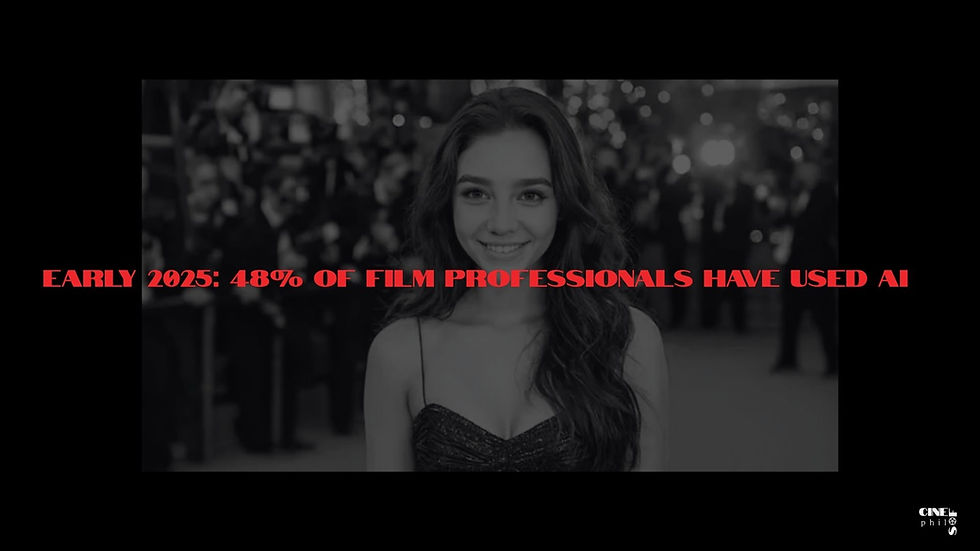City of God: 20 Years of Legacy and Lens on Society
- Sofia R. Willcox

- Aug 10, 2023
- 3 min read
Updated: Sep 13, 2024
Cidade de Deus (Fernando Meirelles, 2002), released two decades ago, continues to hold relevance today. This week, a thirteen-year-old child from the favela depicted in the film was tragically killed during a police operation. It's unsettling how stray bullets seem to find their mark with such precision.
The film is celebrated both in Brazil and internationally for its portrayal of reality, skillfully balancing metaphors with stark reality. Its significance to Brazil is undeniable, yet it also reinforces and highlights foreigners' stereotypes about the country—reducing it to just Rio de Janeiro, favelas, violence, and danger.
Cidade de Deus narrates the story of the favela over several decades through the eyes of Rocket (Alexandre Rodrigues), an aspiring photographer. This documentary-like approach is evident in scenes with handheld camera movements, zooming in and out, and the constant clicking, zooming, and flashing of a camera. The camera screen templates and grids suggest limitations and confinement, mirroring Rocket’s own quest to escape his 'prison' through photography.
Beginning in the 1960s, the film’s golden hues contrast sharply with the harsh reality of the residents' lives. The favelas resulted from gentrification and social cleansing in Rio de Janeiro. One scene highlights the lack of resources and poverty, where the Tender Trio, operating like Robin Hood, blackmails a truck driver to steal a gas cylinder and distribute it to the community. Although the Tender Trio was less violent, the children played pick-up games in the street.
In Blacky’s apartment, we witness Lil Dice (Douglas Silva) transforming into Lil Zé (Leandro Firmino). Initially, Lil Dice plays dice but soon steps into the game of life, becoming Lil Zé—meaning 'the multiplier.' As Lil Zé builds his empire and influences the next generation, the Runts, their lack of opportunities is starkly visible through their torn clothes and firearms. The film grows darker after Benny’s death, depicting the brutal realities of the favela’s most violent era.
The struggle for power in the film’s opening scene and its subsequent depiction is significant. On one side, Lil Zé’s gang brandishes guns, while on the other, police officers do the same. The symbols of weaponry and uniforms highlight their authority. The absence of dialogue, with only the sound of triggers being pressed, emphasizes brutality and violence. Dutch angles used for the police suggest their contradictory role, involving corruption.
At the film’s end, the tightly framed Runts symbolize a predetermined future, contrasting with the optimistic tone of the ending song "O Caminho do Bem." Rather than a symbol of hope, the new generation mirrors Lil Zé, reinforcing the film’s cyclical narrative.
Based on a semi-biographical book, the film and book both offer naturalistic performances and insights into real locations and people. However, the film's aftermath reflects a cycle of socio-economic inequality, highlighted by the Netflix documentary City of God-10 Years Later (Cavi Borges and Luciano Vidigal, 2013), which examines their lives a decade later.
In Brazil, the rich people gets richer, while the poor people gets poorer. The poverty has a dark colour. Its grim reality due to the legacy of African slavery and late abolishment. There was a lack of reparations, and the marginalization of Black people. While the film presents this reality with a glossy sheen, blending Black excellence with hard work, it contrasts sharply with the lived experiences of the unprofessional actors who returned to favela life, becoming overlooked and reduced to mere "stray bullets" in news reports.
Conversely, professional actors, who were already established in Brazil, saw their careers flourish. Seu Jorge (1970-) continued his career as both an actor and musician; Matheus Nachtergaele (1968-) debuted in the successful Auto da Compadecida (Guel Arrares, 2000); Alice Braga (1983-), niece of esteemed actress Sônia Braga (1950-), gained international recognition. Some of them could be spotted in some productions. Meanwhile, Alexandre Rodrigues became an Uber driver, Douglas Silva appeared on a popular reality show, and Rubens Sabino ended up homeless and detained by the police.
Twenty years later, HBO Max released a sequel series featuring most of the original cast, offering more diverse representation. The new generation of Black professional actors and updated storylines show the residents caught between drug traffickers, militias, and government authorities. However, their desire to break the cycle unites the community in confronting their oppressors. The directors have now become producers, and the series has been renewed for a second season.
Can media representations of violence and poverty, such as those in Cidade de Deus, contribute to the perpetuation of stereotypes, or do they serve as a call to action for change?





Comments